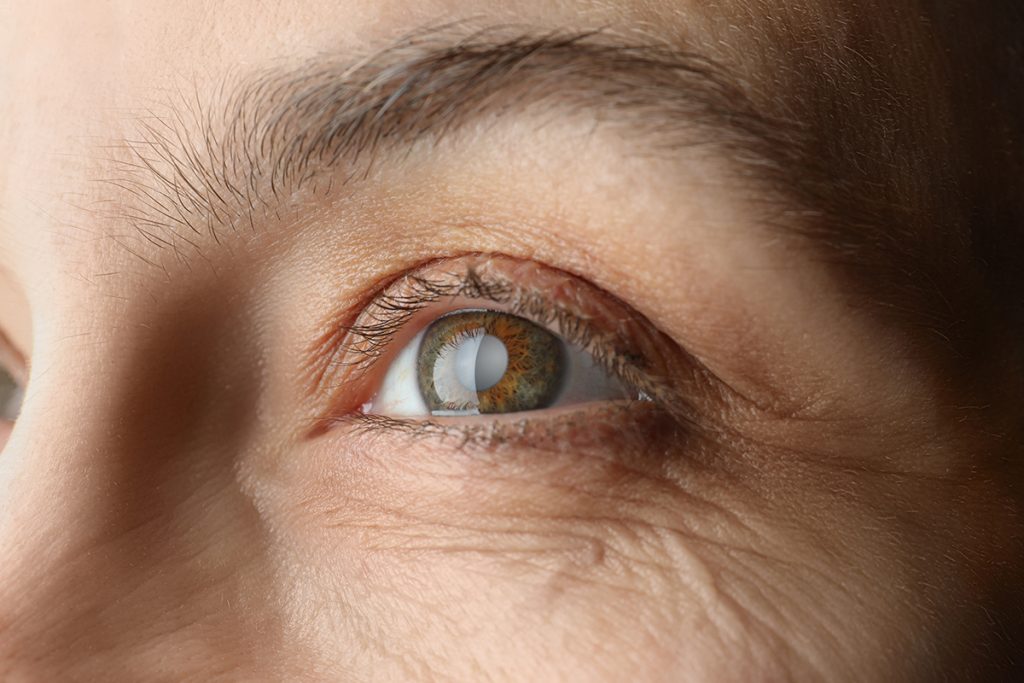
Most people will develop a cataract by their mid-70s, but the average age of cataract patients shows that more and more middle-aged adults choose to have cataract surgery earlier. There could be several reasons for this shift, but the high success rate of this eye surgery coupled with the ability to fix other vision problems with intraocular lens implants could be why.
Our eye doctors at Boston Eye Physicians and Surgeons can diagnose cataracts during regular eye exams and help you determine the best time for cataract surgery.
1. Vision Loss and Your Safety
Cataracts increase your risk of hip fracture! In 2004, Medicare wanted to look at the cost of operating on each eye’s cataract. When millions of Medicare charts were studied, it was discovered that patients were more likely to have fractured hips (from falls) if they had an early diagnosis of cataract but no surgery. When the first eye was operated, the risk of hip fracture went way down and, to the surprise of Medicare, when the second eye was done, the risk was even less. The cost to Medicare to operate both cataracts was much lower than repairing hip fractures when they occurred.
Cataracts happen when the proteins inside your eye’s natural lens clump together, eventually causing blurred vision and a clouded lens appearance. It may take several years for a cataract to cause significant vision loss or blindness, but in that time, it can impact your risk of injury. Progressing cataracts cause difficulty seeing at night, light sensitivity, double vision and other changes to your eyesight. You may have trouble driving in the evenings and struggle to complete detailed tasks.
You don’t have to wait until your vision is affected to have cataract surgery, and this procedure is one of the most successful in modern medicine. Cataract surgery typically takes 15 minutes and uses local anesthesia to numb the eye area so that you can resume your normal activities right away with clearer vision. If you choose a premium IOL, you may no longer need contact lenses or glasses for nearsightedness, farsightedness and astigmatism.
2. Cataract Surgery has a 98% Success Rate
More people opt to have cataract surgery soon after their diagnosis because of the procedure’s high success rate and easy recovery. Cataract surgery is much different today than it was just 100 years ago when extraction rates were successful just 50 percent of the time. In 1949, the first IOL was used, and in 1967, ultrasonic waves revolutionized the industry by softening the cataract for easy removal. That method has evolved into today’s cataract surgery for increased patient safety and better visual outcomes. “Waiting until ripe” is an expression of those old times when “ripe” cataracts leaked fluid that was riskier to the eye than surgery. Today, a cataract operation that repairs any loss of vision function is the safest step.
3. Improve Your Vision at the Same Time
An IOL replaces the clouded natural lens that is removed during cataract surgery. If you are nearsighted, farsighted or have astigmatism, a premium IOL can improve your vision. You can enjoy clear, crisp eyesight after cataract surgery with a premium IOL and most likely won’t need to wear contact lenses or prescription eyeglasses anymore. There are various IOL options, such as monofocal IOLs, which correct your vision at one distance and are standard for cataract surgery through insurance providers. Monofocal IOLs come in toric versions to accommodate astigmatism.
Premium IOLs correct your vision at multiple distances so you can enjoy reading the small print on your phone and seamlessly switch to taking in a scenic view far away — without corrective eyewear.
Schedule Your Eye Exam in Boston to Discuss Cataract Surgery
There are no vision restrictions requiring you to wait for cataract surgery. This safe, effective procedure can restore your vision and improve your overall visual acuity with a premium IOL.
Contact Boston Eye Physicians and Surgeons to schedule your eye exam and discuss the right time for cataract surgery.

